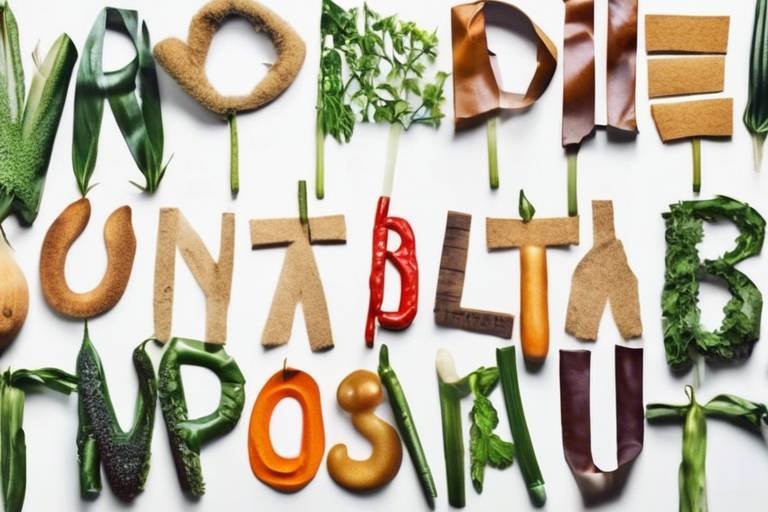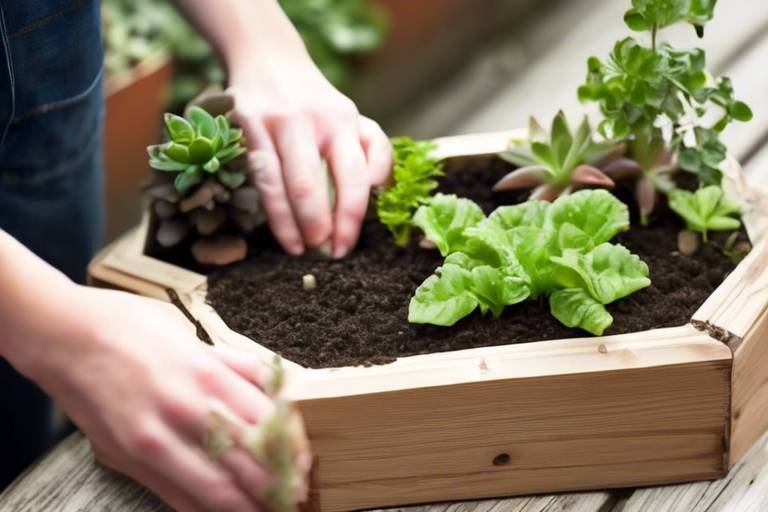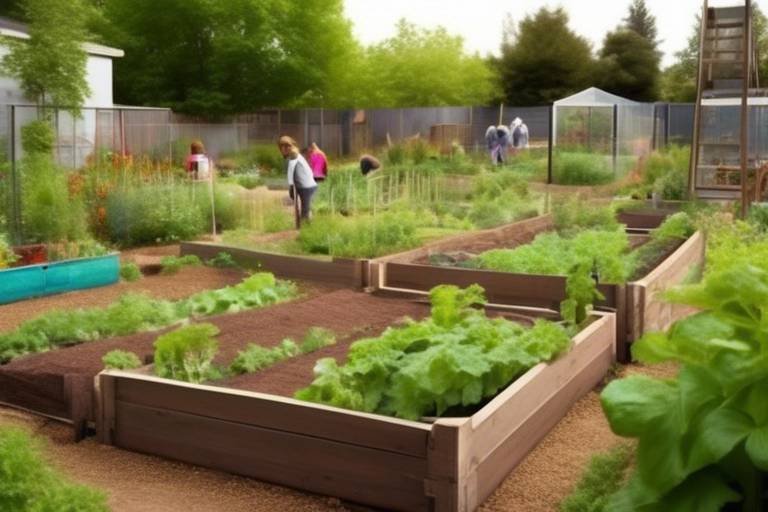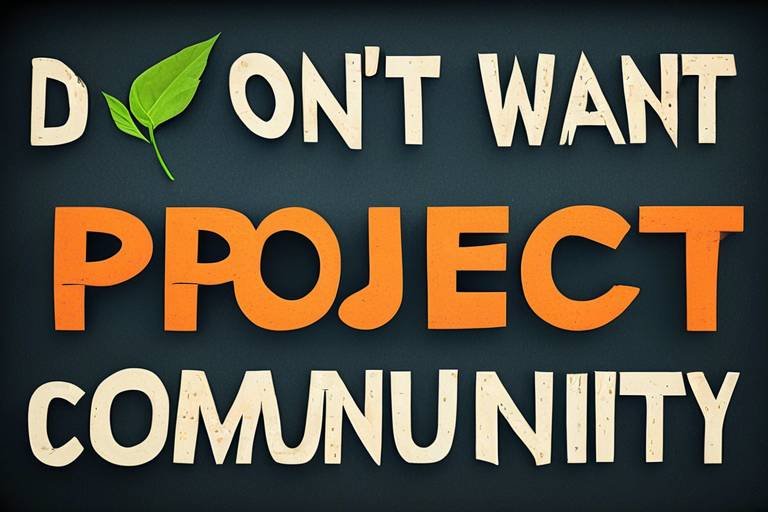10 Ways to Celebrate Sustainability Month
Sustainability Month is a time to reflect on our impact on the environment and explore ways to live more sustainably. It's a chance to celebrate our planet and take action to protect it for future generations. This month is all about finding creative and impactful ways to promote eco-friendly practices and raise awareness about environmental issues. From small daily habits to larger community initiatives, there are countless ways to contribute to a more sustainable future.
One exciting way to celebrate Sustainability Month is by hosting a Clothing Swap Event. This event allows you to reduce waste and promote reuse by exchanging gently used items with friends or coworkers. Not only does it help minimize clothing waste, but it also fosters a sense of community and encourages sustainable fashion choices.
Another fantastic way to honor Sustainability Month is by planting a Community Garden. Collaborating with neighbors to create a shared green space not only promotes local food production and biodiversity but also fosters a sense of unity among residents. Community gardens are a beautiful way to support sustainability efforts and bring people together.
Organizing a Beach Cleanup is a powerful way to make a difference during Sustainability Month. By gathering volunteers to clean up litter along beaches or waterways, you can help protect marine life, preserve coastal ecosystems, and raise awareness about the importance of waste management and conservation. Every piece of trash removed from the beach is a step towards a cleaner, healthier environment.
Reducing Single-Use Plastic is a crucial step towards sustainability. By committing to eliminating single-use plastics from your daily routine and opting for reusable alternatives, you can significantly reduce plastic pollution and promote a more sustainable lifestyle. Small changes in our habits can lead to significant positive impacts on the environment.
Attending Sustainability Workshops is a great way to educate yourself and others about sustainable living practices. These workshops focus on topics such as renewable energy, zero waste lifestyles, and environmental conservation. By increasing awareness and knowledge about sustainability, we can inspire positive changes in our communities.
Supporting Local Farmers Markets is not only a delicious way to celebrate Sustainability Month but also a way to support sustainable agriculture practices. By purchasing fresh, locally grown produce, you are reducing the carbon footprint associated with food transportation and supporting small-scale farmers. It's a win-win for your health and the environment.
Starting a Composting Initiative is a fantastic way to reduce waste and create nutrient-rich soil for plants. Composting organic waste from your kitchen and garden helps reduce methane emissions from landfills, minimizes waste sent to incinerators, and promotes a circular economy based on natural processes. It's a simple yet powerful way to contribute to sustainability.
Hosting a Sustainable Living Challenge can be a fun and engaging way to involve friends, family, or colleagues in sustainability efforts. By setting goals and tracking progress in reducing energy consumption, water usage, or waste generation, you can inspire collective action towards a more sustainable lifestyle. Challenges like these help create a sense of accountability and motivation for positive change.

Host a Clothing Swap Event
Hosting a clothing swap event is a fantastic way to promote sustainability and community engagement. Imagine a gathering where friends or coworkers come together, each bringing gently used clothing items they no longer need but are still in good condition. Participants swap their items, giving new life to preloved pieces and reducing the demand for new clothing production.
Not only does a clothing swap event help to declutter our closets, but it also significantly reduces textile waste that would otherwise end up in landfills. By extending the lifespan of clothing through swapping, we contribute to a circular economy where resources are reused and shared among the community.
During the event, participants can enjoy the thrill of discovering hidden gems in someone else's wardrobe, fostering a sense of excitement and camaraderie. It's a sustainable way to refresh your style without contributing to the environmental impact of fast fashion.
Moreover, hosting a clothing swap event can spark conversations about conscious consumerism and the environmental implications of our fashion choices. It serves as a reminder that small actions, such as swapping clothes, can collectively make a big difference in reducing our carbon footprint and promoting sustainable practices.

Plant a Community Garden
Planting a community garden is not just about growing fruits and vegetables; it's about cultivating a sense of togetherness and sustainability within your neighborhood. Imagine a patch of land transformed into a vibrant oasis where residents come together to nurture plants, share knowledge, and reap the rewards of their collective efforts. By collaborating with your neighbors to establish a shared green space, you are not only fostering biodiversity but also fostering a strong sense of community.
Community gardens serve as more than just a source of fresh produce; they are living classrooms where individuals of all ages can learn about gardening, environmental stewardship, and the interconnectedness of nature. These green spaces promote local food production, reduce food miles, and encourage a deeper connection to the land and the food we eat.
Moreover, community gardens offer a platform for social interaction, where friendships are forged, stories are shared, and bonds are strengthened over a common goal of sustainable living. They provide a sanctuary amidst urban landscapes, a place where the stress of daily life melts away in the presence of blooming flowers and thriving plants.
Through a community garden, you contribute to the preservation of green spaces in your neighborhood, creating havens for pollinators, birds, and other wildlife. By planting native species and practicing organic gardening methods, you support biodiversity and help restore balance to the ecosystem.
So, grab your gardening tools, rally your neighbors, and embark on the journey of planting a community garden. Together, you can sow the seeds of sustainability, nurture a shared passion for the environment, and watch as your garden blooms into a vibrant symbol of unity and resilience.

Organize a Beach Cleanup
Organizing a Beach Cleanup is a powerful way to make a direct impact on the environment and raise awareness about the importance of preserving our coastlines. By gathering a group of volunteers to remove litter and debris from the beach, you are not only helping to protect marine life and ecosystems but also inspiring others to take action towards a cleaner and healthier planet.
During a Beach Cleanup event, volunteers can work together to collect trash, separate recyclables, and properly dispose of hazardous materials. By documenting the types and quantities of waste collected, participants can gain valuable insights into the sources of pollution and advocate for sustainable waste management practices.
Furthermore, Beach Cleanups provide an opportunity to engage with the local community, foster environmental stewardship, and educate individuals about the negative impacts of plastic pollution and littering. By working together towards a common goal, volunteers can experience a sense of camaraderie and shared purpose, creating a ripple effect of positive change.
Remember, the impact of a Beach Cleanup extends beyond the physical act of cleaning up trash. It sends a powerful message about the value of our natural resources, the importance of conservation, and the collective responsibility we have to protect the environment for future generations.

Reduce Single-Use Plastic
Reducing single-use plastic is a crucial step towards a more sustainable future. By making simple changes in our daily habits, we can significantly decrease the amount of plastic waste that ends up in landfills and oceans. One effective way to reduce single-use plastic is by switching to reusable alternatives. Investing in a durable water bottle, shopping bags, and utensils can help eliminate the need for disposable plastics, ultimately cutting down on pollution and environmental harm.
Imagine the impact of each person choosing a reusable water bottle over single-use plastic bottles. It may seem like a small change, but when multiplied by millions, it can lead to a substantial reduction in plastic waste. By making conscious decisions to avoid single-use plastics, we not only lessen our own environmental footprint but also set a positive example for others to follow.
Additionally, raising awareness about the harmful effects of single-use plastic is essential in encouraging widespread adoption of sustainable practices. Educating friends, family, and communities about the benefits of reducing plastic consumption can inspire collective action and create a ripple effect of positive change. Together, we can work towards a cleaner, greener future by minimizing our reliance on disposable plastics and embracing reusable alternatives.

Attend Sustainability Workshops
Are you passionate about sustainability and eager to learn more about eco-friendly practices? Attending sustainability workshops can be a fantastic way to deepen your knowledge and connect with like-minded individuals who share your commitment to environmental conservation.
These workshops cover a wide range of topics, from sustainable living practices to renewable energy solutions and waste reduction strategies. By participating in these educational sessions, you can gain valuable insights into how your daily choices impact the environment and discover practical tips for living a more sustainable lifestyle.
Furthermore, sustainability workshops often feature expert speakers, interactive activities, and hands-on demonstrations that make learning engaging and enjoyable. Whether you're interested in composting, water conservation, or ethical fashion, there's a workshop out there to suit your interests and inspire positive change.
Moreover, attending sustainability workshops allows you to stay informed about the latest trends and innovations in the field of sustainability. You'll have the opportunity to ask questions, share ideas, and network with professionals who are leading the way in creating a more sustainable future for our planet.
So, why not take the first step towards becoming a sustainability champion by attending a workshop in your area? Joining these events can not only expand your knowledge but also empower you to make informed choices that benefit both the environment and future generations.

Support Local Farmers Markets
Supporting local farmers markets is not just about buying fresh produce; it's about investing in your community's sustainability and well-being. When you choose to shop at farmers markets, you are not only getting high-quality, seasonal fruits and vegetables, but you are also supporting small-scale farmers who use environmentally friendly practices. By reducing the distance your food travels from farm to table, you are decreasing the carbon footprint associated with transportation and contributing to a more sustainable food system.
At farmers markets, you have the opportunity to connect with the people who grow your food, ask them questions about their farming methods, and learn more about where your food comes from. This direct interaction fosters a sense of transparency and trust in the food you are consuming, promoting a deeper connection to the land and the environment. Additionally, shopping at farmers markets helps to preserve farmland and protect biodiversity by supporting local agricultural practices that prioritize soil health and ecosystem sustainability.
Moreover, by choosing to buy from local farmers markets, you are investing in the local economy and supporting small businesses in your community. The money you spend at farmers markets stays within the region, circulating back into the community and contributing to its overall prosperity. This economic resilience helps to create a more vibrant and self-sustaining local food system that benefits everyone involved, from farmers to consumers.

Start a Composting Initiative
Starting a composting initiative is a fantastic way to reduce waste and create nutrient-rich soil for your plants. By diverting organic materials from landfills, you not only help the environment but also contribute to the health of your garden. Composting is a natural process that mimics the decomposition of organic matter in nature, turning kitchen scraps and yard waste into a valuable resource.
When beginning a composting project, it's essential to select a suitable location for your compost bin or pile. Choose a spot that is convenient to access, receives adequate sunlight, and has good drainage. Additionally, consider the size of your composting system based on the amount of organic waste your household generates.
There are two primary types of composting methods: aerobic and anaerobic. Aerobic composting involves turning the compost pile regularly to introduce oxygen, speeding up the decomposition process. On the other hand, anaerobic composting is a slower process that doesn't require turning but may produce odors. Select the method that best fits your lifestyle and composting goals.
It's important to maintain a balance of green (nitrogen-rich) and brown (carbon-rich) materials in your compost pile. Green materials include fruit and vegetable scraps, coffee grounds, and grass clippings, while brown materials consist of dried leaves, straw, and cardboard. Layering these materials correctly will help create a healthy compost pile with the right carbon-to-nitrogen ratio.
Regularly monitoring and aerating your compost pile will help accelerate the decomposition process and prevent odors. Turning the pile with a pitchfork or compost aerator every few weeks will ensure that oxygen reaches all parts of the pile, promoting the growth of beneficial microorganisms that break down the organic matter.
Once your compost is ready, it can be used to enrich the soil in your garden, providing essential nutrients for plants and improving soil structure. Spread the finished compost around your garden beds or mix it into potting soil for container plants. Composting not only reduces waste but also creates a sustainable cycle of nutrient recycling in your own backyard.

Host a Sustainable Living Challenge
Hosting a Sustainable Living Challenge is an exciting way to engage with others and promote eco-conscious habits. Imagine challenging your friends, family, or colleagues to join you in a friendly competition to reduce their energy consumption, water usage, or waste generation. It's like embarking on a sustainability adventure together, where each participant plays a vital role in creating a greener future.
Setting up the challenge can be as simple as creating a list of sustainability goals and tracking progress over a specific period. You can establish categories like recycling efforts, energy-saving practices, or even sustainable transportation choices. Encourage participants to share their experiences, tips, and successes along the way to inspire each other and foster a sense of community.
Consider organizing regular check-ins or meetings to discuss challenges faced, solutions discovered, and overall progress. Celebrate achievements and milestones reached throughout the challenge to keep everyone motivated and engaged. Remember, the goal is not perfection but progress towards a more sustainable lifestyle that benefits both individuals and the environment.
Frequently Asked Questions
- What is Sustainability Month?
Sustainability Month is a dedicated period to raise awareness about eco-friendly practices, environmental conservation, and promoting sustainable living. It serves as a platform to inspire individuals and communities to take action towards a more sustainable future.
- How can I participate in Sustainability Month?
There are various ways to participate in Sustainability Month, such as hosting events like clothing swaps, beach cleanups, or sustainable living challenges. You can also attend workshops, support local farmers markets, or start initiatives like composting to contribute to the cause.
- Why is reducing single-use plastic important?
Reducing single-use plastic is crucial because it helps minimize plastic pollution in the environment, especially in oceans and waterways. By using reusable alternatives, we can significantly decrease the negative impact of plastic waste on wildlife and ecosystems.
- What are the benefits of attending sustainability workshops?
Attending sustainability workshops provides valuable knowledge and insights on sustainable living practices, renewable energy, waste reduction, and environmental conservation. It empowers individuals to make informed choices and adopt eco-friendly habits in their daily lives.
- How does supporting local farmers markets contribute to sustainability?
Supporting local farmers markets promotes sustainable agriculture by reducing the carbon footprint associated with food transportation. It also helps small-scale farmers thrive, preserves biodiversity, and fosters a stronger connection between consumers and local food sources.



















